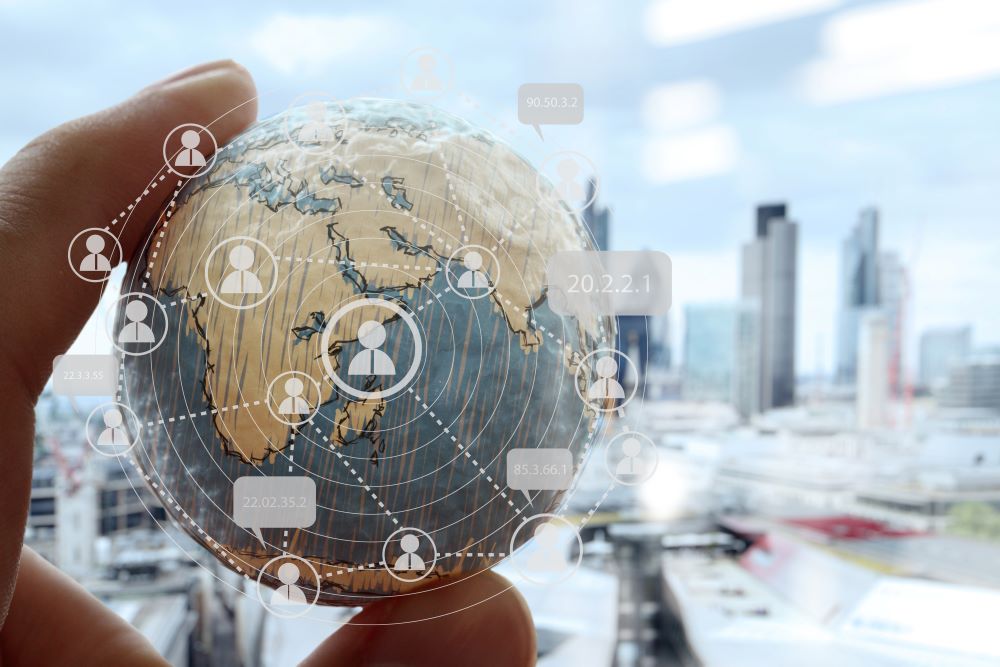
The Department for Business and Trade (DBT) yesterday (28 February) published the ‘Global Trade Outlook’ which explores the latest trends in international trade and makes a number of key predictions.
The paper looked at everything from what the global trade market will look like over the next few decades, to the UK’s continued position as a top trading nation, to the rise of the next major importing and exporting nations.
The IOE&IT Daily Update gives you five key takeaways from this latest government report.
1. GDP and trade
Trade growth and GDP are expected to be closely linked in the future, with the latter expected to see slower gains as the world population ages and birth rates decline.
According to the report, future expansion in imports and exports is likely to match GDP growth on a global level.
The IMF expects world trading volumes to remain at around 3-4% by the mid-2020s, before growing in line with GDP throughout the preceding two decades.
Overall, global trade is expected to almost quadruple between 2021 and 2050, largely focused around Europe, North America, China and Asia Pacific.
2. Power shifts
The DBT broadly expects trading power to shift eastwards.
The report notes that in 2021 the top 30 markets amounted to 80% of global demand; the top ten countries were responsible for half of global import demand.
As emerging economies grow and develop, the composition of these markets is expected to change, with the so-called ‘E7 group’ of countries – China, India, Brazil, Russia, Indonesia, Mexico and Turkey – closing in on the G7 in terms of trade.
Other emerging economies, like the Philippines and Vietnam, are also expected to rise up the trading ranks.
3. Services over goods
The outlook predicts that global trade will slowly move towards services and away from goods by 2035.
Service sectors’ share of trade is projected to rise to 28% by 2035 from 21% in 2021, partly driven by technology but also fuelled by the demands of an expanding ‘global middle class’.
Travel is one of the international service sectors expected to benefit most, while the oil and gas sector is expected to lose out due to the green transition.
4. UK’s advantage
Currently, the UK economy enjoys trade advantages in several sectors. Financial services, business services and aerospace are some of the areas where the UK has a natural edge over competing nations.
The outlook predicts that some of these areas will allow the country to benefit from the predicted shifts in international trade.
Global import demand for UK specialist sectors is projected to grow from $6.1tn (£4.4tn) in 2021 to $16.1tn (£11.2tn) by 2035. Sectors like life sciences (seeing an increase in demand of 114%), digital services (up 161%) and aerospace (up 176%) are expected to benefit.
Overall, the UK is still expected to remain one of the world’s largest trading countries, despite growth in other markets, and still remain in the top 10 of global traders.
5. Further growth
A key part of the government’s projections is the rise of an overseas ‘middle class’ that could provide new sales targets for British businesses.
The number of people with a ‘very high’ income (a per capita income over $46,381) is projected to expand globally by around 300m between 2021 and 2035, and by a further 400 million by 2050.
This will occur both in regions that traditionally dominate international trade and those that are expected to emerge over the course of the next few decades.
Badenoch speech
In a speech delivered at the launch of the Legatum Institute's Prosperity Index yesterday, business and trade secretary Kemi Badenoch shared her five priorities for the UK’s place in the future global trading system.
These were:
- ‘Removing barriers that stop businesses succeeding’
- Increasing UK exports until the country hits the £1 trillion mark in value in 2030
- Making the UK the “top investment destination in Europe”
- Signing “high quality trade deals”
- Ensuring “free and fair trade”
Global trade and global prosperity
On the final point she said that global prosperity depends on rules-based trade.
“Too often people of think of fair trade as just giving money to poor countries,” she said. “Fair trade, for me, means ensuring that the rules-based trading system continues to thrive and does not collapse in the face of protectionism.”
She called out the Biden administration’s Inflation Reduction (IR) Act, which the US’ allies have criticised for being overly protectionist.
“Interventions like the IR Act may look good in the short term,” she said. “But, in the long term, it runs the risk of becoming self-defeating, not least by creating a single point of failure on supply chains.”



